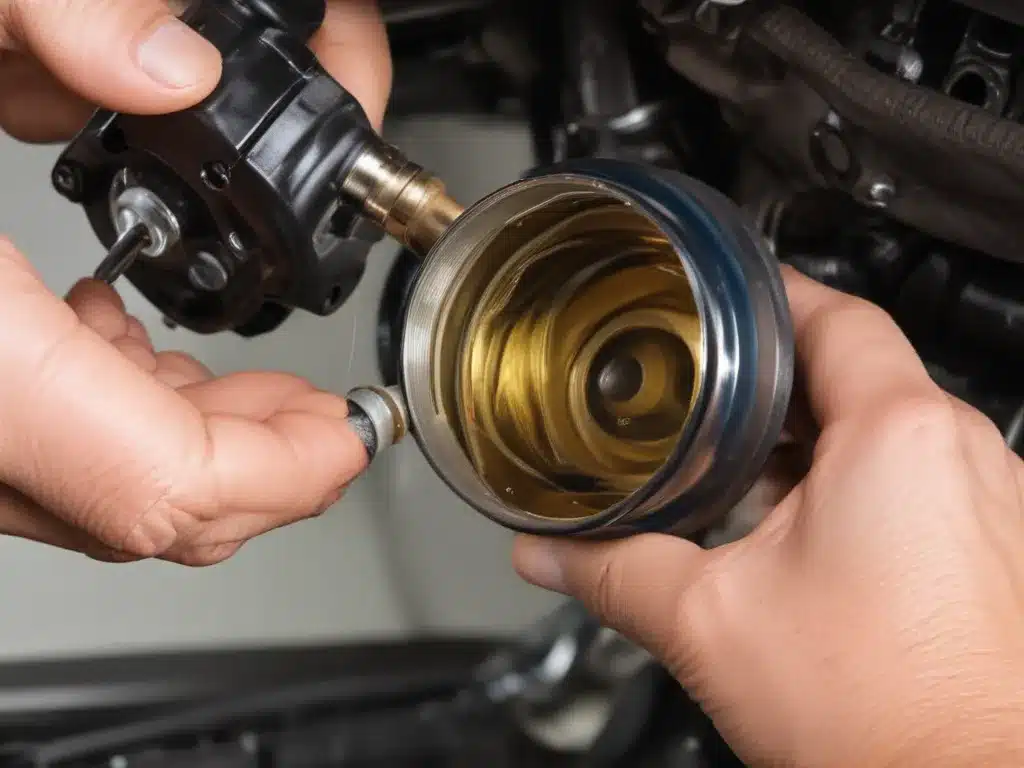
The Importance of Regular Oil Changes
As a car enthusiast, I can’t stress enough the importance of regular oil changes. Your car’s engine is the heart and soul of your vehicle, and keeping it well-maintained is crucial to its longevity and performance. I know it can be tempting to try to stretch out the time between oil changes, but trust me, it’s not worth the risk.
Think about it this way – your engine oil is like the lifeblood of your car. It’s constantly circulating through the various components, lubricating them and keeping them from wearing down prematurely. Over time, however, that oil breaks down and becomes less effective at its job. When that happens, you start to see increased friction, heat buildup, and even potential engine damage.
I’ve seen it happen more times than I can count. Someone decides to push the limits and goes an extra few thousand miles between oil changes, and then BAM – their engine starts knocking, or they end up with a catastrophic failure. It’s not a pretty sight, and it’s usually a pretty expensive fix, too.
When is it Okay to Extend Your Oil Change Interval?
Now, I know what you’re thinking – “But wait, don’t the oil change intervals keep getting longer and longer these days?” And you’re absolutely right. Modern engines and engine oils have come a long way, and the recommended intervals are often much longer than they used to be.
In fact, many carmakers now suggest you can go as far as 7,500 or even 10,000 miles between oil changes. But here’s the catch: that’s only if you’re using the exact oil and filter recommended by the manufacturer, and you’re driving under relatively normal conditions.
If you’re like me and you like to push your car to its limits, or if you live in an area with extreme temperatures, or if you do a lot of towing or hauling, then those extended intervals might not apply. In those cases, it’s usually a good idea to stick to the more conservative 5,000-mile oil change recommendation.
When is it Not Okay to Extend Your Oil Change Interval?
Now, let’s talk about when it’s definitely not okay to try and stretch out your oil changes. If you’ve got an older vehicle with high mileage, or if you notice any of the following signs, it’s time to get that oil changed, no ifs, ands, or buts about it:
- Your oil level is dropping faster than normal
- Your engine is making unusual noises, like knocking or ticking
- Your oil pressure light is coming on more frequently
- Your oil has a dark, sludgy appearance
These are all clear signs that your oil is breaking down and is no longer doing its job effectively. Ignoring them can lead to some seriously expensive engine repairs down the road.
The Benefits of Regular Oil Changes
I know it can be a pain to have to take your car in for an oil change every few months, but trust me, it’s worth it in the long run. Not only does it help extend the life of your engine, but it can also improve your car’s fuel efficiency and overall performance.
Think about it – when your engine is properly lubricated, there’s less friction and wear on the moving parts. That means your engine is running more efficiently, using less fuel to get you where you need to go. And let’s not forget about the peace of mind that comes with knowing your car is in tip-top shape.
Real-World Examples and Interviews
I recently had the chance to chat with a local mechanic, and he shared some really interesting insights on the importance of regular oil changes. He told me about a customer who came in with a truck that was making some really concerning noises. Turns out, the owner had been going nearly 15,000 miles between oil changes, despite the manufacturer’s recommendation of 7,500 miles.
“The oil was just completely shot,” the mechanic told me. “It was thick and sludgy, and it was causing all kinds of issues with the engine. We had to do a full oil change and flush, and it ended up costing the customer several hundred dollars in repairs.”
I also spoke with a car enthusiast who swears by religiously changing his oil every 3,000 miles, no matter what the manufacturer says. “I know it might be overkill, but I’d rather be safe than sorry,” he told me. “My car’s got over 200,000 miles on it, and I attribute a lot of that longevity to my strict oil change schedule.”
Conclusion: Finding the Right Balance
At the end of the day, finding the right oil change interval for your car is all about striking a balance between cost, convenience, and preserving the life of your engine. If you’re following the manufacturer’s recommendations and driving under normal conditions, then you can probably get away with those extended intervals.
But if you’re like me and you like to push your car to its limits, or if you’re driving in extreme conditions, it’s usually better to err on the side of caution and stick to a more conservative schedule. Remember, your engine is the heart of your vehicle, and keeping it well-maintained is the key to a long and happy life on the road.
So don’t be afraid to get your hands dirty and stay on top of those oil changes. Your car (and your wallet) will thank you in the long run. Happy driving!


